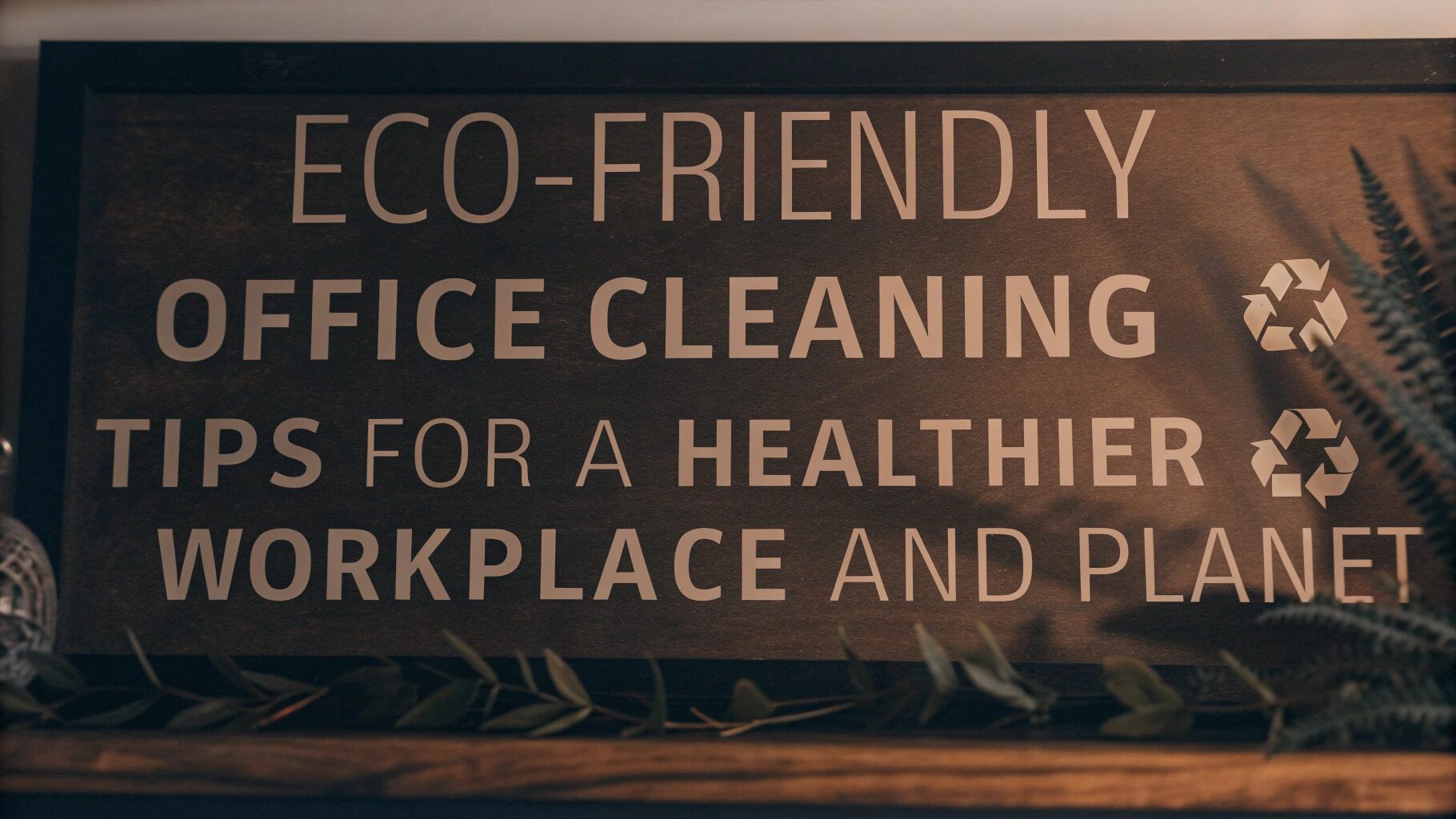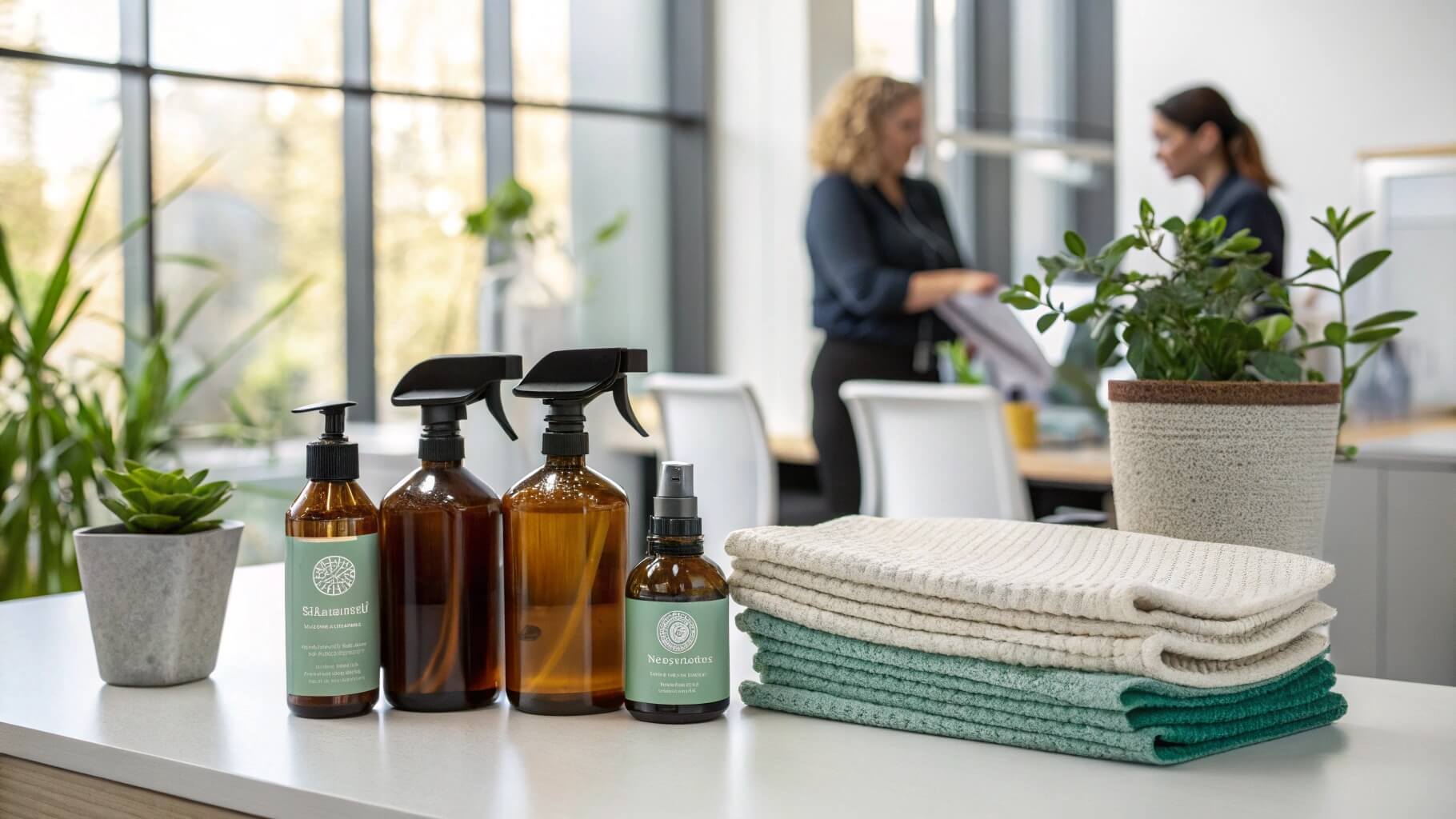Eco-Friendly Office Cleaning Tips for a Healthier Workplace and Planet

Imagine walking into your office on Monday morning and, instead of the strong chemical scent of industrial cleaners, you find fresh, naturally clean surroundings that don't cause your colleague's asthma or water your eyes. Sounds rather excellent, don't you think? Actually, establishing an environmentally friendly workplace goes beyond just feeling good about your impact on the surroundings, even if that is quite a benefit. It's about making the place better for everyone who spends their working hours there and doing your share for the earth we all live on.
Australian companies are realising more and more that the change to sustainable cleaning methods is not only a trend but also a need. Given more Aussies spending significant time indoors, especially in air-conditioned offices, the quality of our indoor air has never been more critical. Volatile organic compounds (VOCs) found in conventional cleaning products sometimes aggravate indoor air quality and cause headaches and respiratory problems. Changing to greener substitutes not only lessens your environmental impact but also invests in your team's health and welfare.
Appreciating the Environmental Effect of Conventional Office Cleaning
It's important to know what we are up against before we start looking at fixes. Harsh chemicals, including ammonia, chlorine bleach, and petroleum-based solvents, abound in conventional office cleaning supplies. Using these products sends chemicals into the air that might linger long after cleaning is finished. These drugs eventually find their way into our rivers and soil, so they aggravate environmental damage rather than just disappearing.
Given water conservation is always on our minds in Australia, where we live, it's especially crucial to think about how cleaning products impact our priceless water supplies. Many traditional cleaners include phosphates and other chemicals that might aggravate algae blooms in our rivers and coastal regions, upsetting already stressed marine ecosystems from climate change.
Conventional cleaning products' packaging also poses environmental problems. Most conventional cleaning products are packaged in single-use plastic containers, which contribute to Australia's growing waste problem. The total effect becomes rather important when you realise that the typical office building uses several dozen different cleaning products all year long.
Essentials for Green Cleaning Your Office
Changing to environmentally friendly office cleaning does not mean overhauling your current practices. Rather, it's about choosing wisely with the tools and products you employ. The basis of green cleaning is knowledge that good cleaning calls for the correct methods and combinations rather than strong chemicals.
First, concentrate on multipurpose cleaners capable of handling several surfaces and jobs.
- A basic white vinegar and water mixture can reasonably clean glass, mirrors, and most tough surfaces.
- Baking soda is a mild abrasive that won't scratch surfaces but will eliminate tough stains and smells for harder jobs.
- Essential oils such as lemon, eucalyptus, or tea tree not only have natural antibacterial qualities but also leave your workplace smelling clean without synthetic fragrances.
When choosing commercial environmentally friendly products, search for Australian-made choices bearing certifications from reputable environmental agencies. These products are designed to be biodegradable, non-toxic, and efficient, so relieving you of the guilt that you are choosing responsibly without sacrificing hygiene.
Designing Your Own Natural Cleaning Solutions
Finding how powerful basic, natural products can be is one of the most satisfying features of environmentally friendly office cleaning. Making your own cleaning solutions is not only eco-friendly but also reasonably priced, which appeals especially to Australian companies trying to control running costs.
- For overall surface cleaning: In a spray bottle, mix equal parts white vinegar and water. On desks, keyboards, and most office equipment, this solution performs brilliantly. Vinegar's naturally breaking down grime and antimicrobial qualities come from its acetic acid. Add a few drops of your preferred essential oil to cover the strong vinegar smell if it bothers you.
- For glass and mirror cleaning: Using water, vinegar, and a little dishwashing liquid makes glass and mirror cleaning simple. Particularly useful in Australia's dusty environment, where windows and glass surfaces demand regular attention, this mix cuts through fingerprints and smudges without leaving streaks.
- For carpet stains and upholstery: Make a paste from baking soda and a little water. Let it sit on the stain for several hours or overnight; then, vacuum completely. Common in office environments, food stains and coffee spills call for this approach to be especially helpful.
Eco-Friendly Tools and Cleaning Equipment
When it comes to developing a really sustainable office cleaning schedule, the tools you use for cleaning are just as vital as the products themselves. Excellent investments are microfiber cloths since they are quite efficient in catching dust and bacteria without calling for chemical cleaners. Compared to throwaway paper towels and cleaning wipes, they also are reusable and washable, so cutting waste.
When it comes to vacuum cleaners, selecting energy-efficient models with HEPA filters guarantees that you're actually eliminating dust from your office environment rather than merely dragging it around. Think about the kind of hoover bags you use; choose biodegradable models when suitable, or consider bagless models that eliminate this waste stream.
Invest in premium mops and cleaning tools instead of less expensive substitutes that must be replaced often. These will last years. Increasingly available and durable, bamboo and recycled plastic handles support environmentally friendly manufacturing methods.
Using Green Techniques in Daily Office Operations

Making the switch to environmentally friendly office cleaning calls for developing new habits and routines that support your environmental objectives, not only for changing products. Establishing cleaning plans that stop the accumulation of dirt and grime will help you start with often more demanding (and maybe chemical-heavy) cleaning solutions to handle.
Please provide employees with basic, safe cleaning tools they can use daily to take ownership of their immediate work areas. At every workstation, a microfiber cloth and a little spray bottle containing diluted vinegar solution help avoid the need for more thorough weekly cleaning.
Think also about the timing of your cleaning chores. Particularly in Australian summers, natural ventilation works better in cooler parts of the day. While cleaning, opening windows and doors lets fresh air flow and accelerates the dispersion of any residual cleaning solution smells.
Expert Eco-Friendly Cleaning Services
Many Australian businesses find it sensible to collaborate with expert cleaning companies with an eye towards environmentally friendly methods. Ask about the environmental policies, products used, and waste management techniques of commercial maintenance providers when assessing them. Many professional services now provide green cleaning choices that mix environmental responsibility with the ease of outsourced cleaning.
Commercial-grade natural products and tools that might not be easily accessible to individual offices are typically available to professional environmentally friendly cleaning services. Particularly important in Australia's resource-conscious corporate environment, they also bring knowledge about effective cleaning techniques that minimise water use and waste generation.
Advantages Beyond Environmental Effects
Though those alone make the effort valuable, the benefits of environmentally friendly office cleaning go far beyond mere environmental concerns. Eliminating strong cleaning chemicals from their workplace usually helps staff members with allergies or chemical sensitivities to feel much more comfortable. Along with the environmental benefits, this can result in fewer sick days and higher productivity, so benefiting businesses.
Australian offices, where buildings are sometimes sealed for air conditioning efficiency, show especially clear improvements in indoor air quality. Improved concentration, fewer headaches, and general better workplace wellness are outcomes of better air quality. Higher employee satisfaction and retention made possible by these elements have actual value for companies vying for talent in the current market.
Usually surprising to business owners are the cost savings connected with environmentally friendly cleaning methods. Many natural cleaning solutions cost far less than their commercial counterparts, and the multipurpose character of ingredients like vinegar and baking soda means you need fewer different products to achieve the same results.